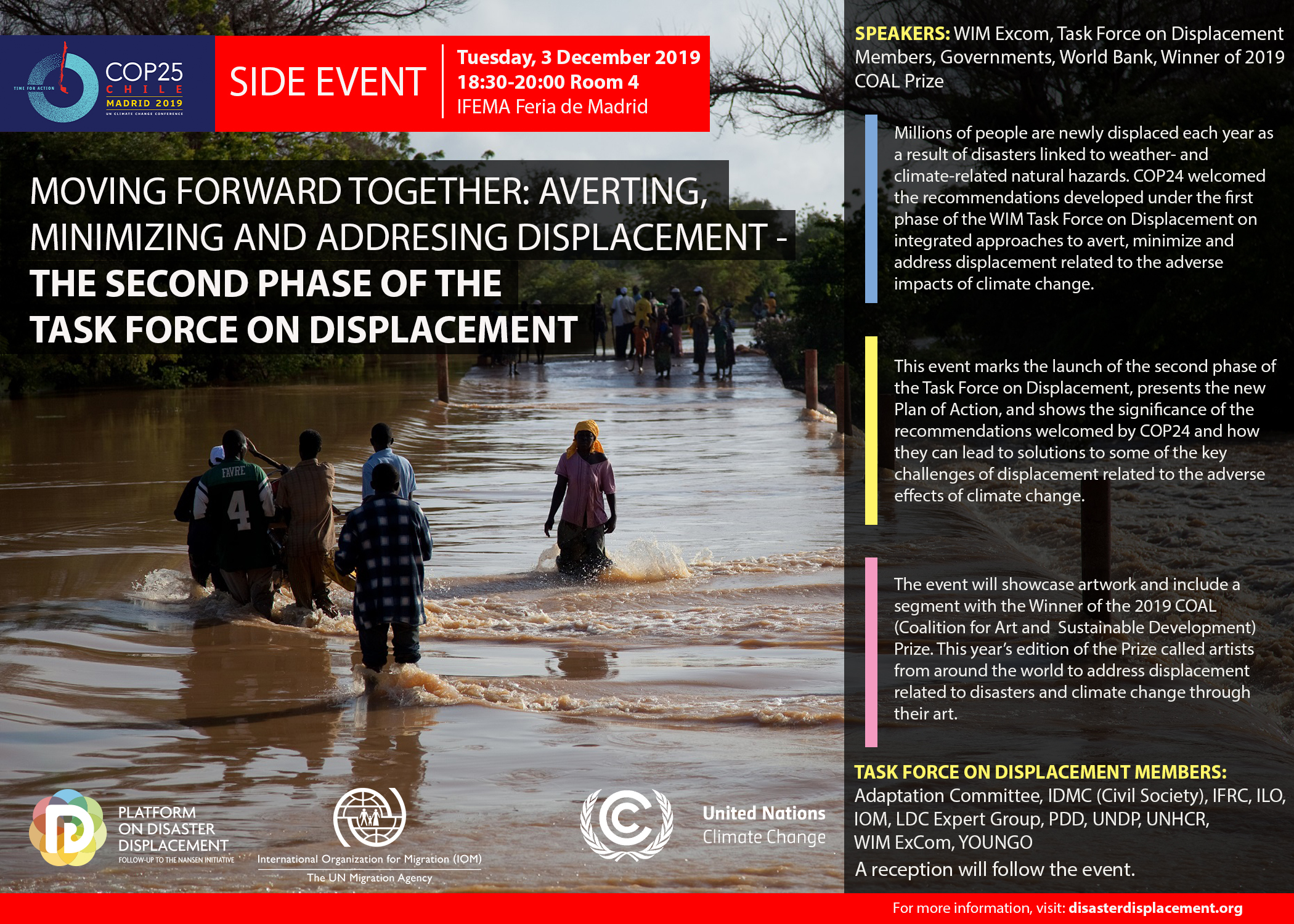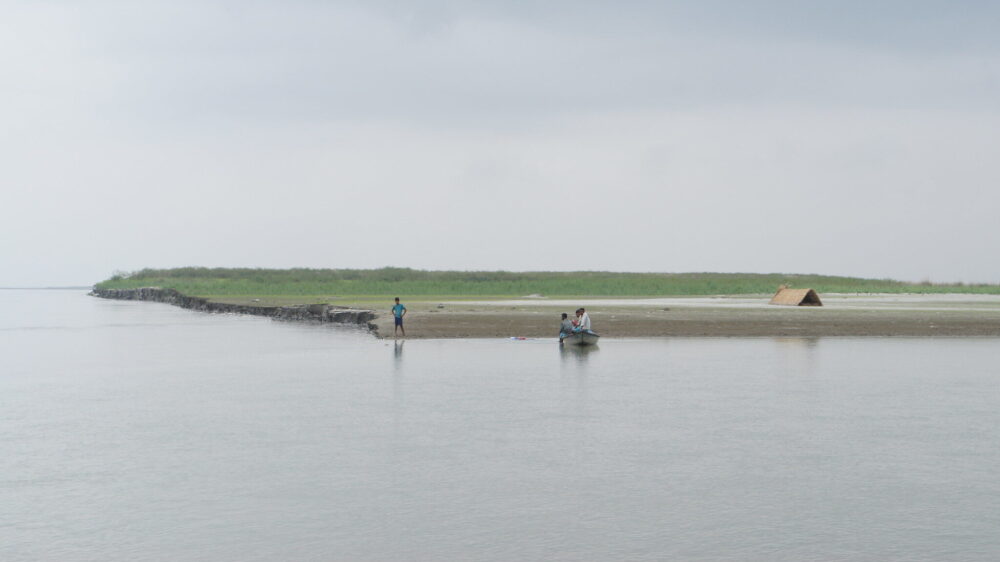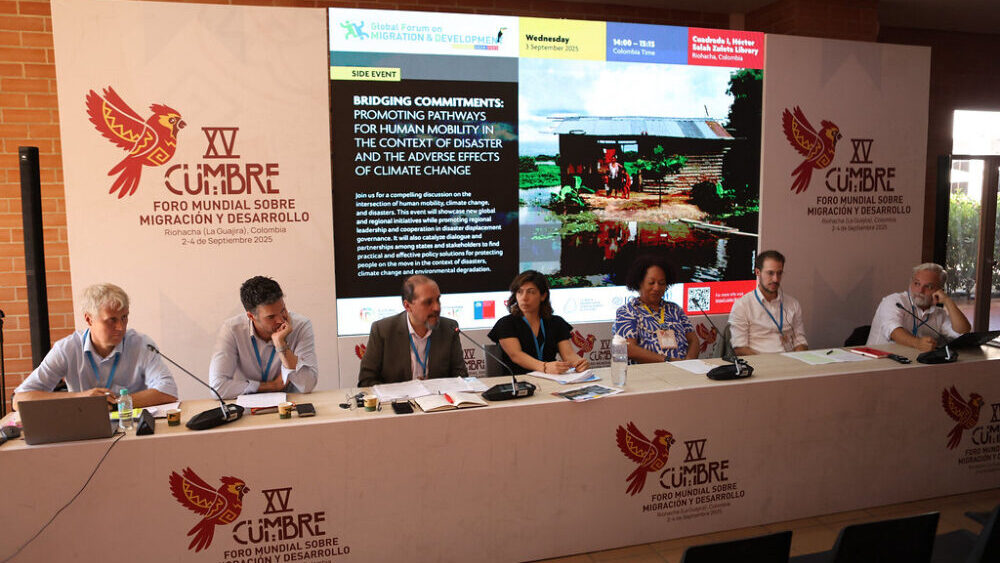COP25 Side Event | Moving Forward Together: Averting, Minimizing and Addressing Displacement – The Second Phase of the Task Force on Displacement

Warsaw International Mechanism (WIM) Task Force on Displacement (TFD)
Moving Forward Together: Averting, Minimizing and Addressing Displacement –
The Second Phase of the Task Force on Displacement
COP25 WIM Executive Committee and Task Force on Displacement Side Event
Tuesday, 03 December 2019
18:30 – 20:00
Room: 4
- Background
In 2018, it is estimated that 19.2 million people were newly displaced as a result of disasters linked to natural hazards, a majority of which were weather- and climate-related. This number is likely much higher when accounting for people compelled to move from their place of origin in the context of slow-onset events and processes linked to the adverse effects of climate change and environmental degradation.
Large-scale movements of people, with climate change as one of the drivers, affect regions across the world, particularly countries and communities most vulnerable to climate change, including Small Island Developing States and Least Developed Countries.
The acknowledgement of the link between climate change and such movements is nothing new: in 1990, the first Intergovernmental Panel on Climate Change (IPCC) report warned policymakers that “the gravest effects of climate change may be those on human migration as millions are displaced by shoreline erosion, coastal flooding and severe drought”[1]. Looking towards the future, the World Bank projects that in three regions (Sub-Saharan Africa, South Asia and Latin America), without additional and concrete climate and development action by 2050, more than 143 million people could be forced to move within their own countries to escape the slow-onset impacts of climate change[2].
Responding to the challenges of human mobility and situations when people are compelled to move from their places of origin in the context of the adverse impacts of climate change and disasters as one of many drivers, is a critical challenge of our times across all regions. The issue involves developmental, humanitarian, and human rights challenges and will increasingly require investments in understanding and identifying risks, reducing vulnerability and exposure, and addressing impacts and protection needs. Moreover, efforts to address the drivers that compel people to leave their places of origin and measures to manage and ensure safe, orderly and regular human mobility when movement of people is unavoidable, require international cooperation and integrated whole-of-government approaches with the participation of all relevant stakeholders.
- Task Force on Displacement under the Warsaw International Mechanism for Loss and Damage
The adoption of the Paris Agreement under the UNFCCC on 12 December 2015 at COP21 represents a milestone in the international response to the challenges of human mobility in the context of the adverse effects of climate change. COP21 mandated the Executive Committee of the Warsaw International Mechanism for Loss and Damage associated with Climate Change Impacts (the Executive Committee) to establish a Task Force on Displacement (TFD) to develop recommendations for integrated approaches to avert, minimize and address displacement related to the adverse impacts of climate change.
The Executive Committee and TFD delivered on this mandate in September 2018 and recommendations on integrated approaches to averting, minimizing and addressing displacement related to the adverse impacts of climate change were subsequently welcomed by COP24 in December 2018, which also decided to extend the mandate of the TFD.
Following from this, the Executive Committee adopted the new terms of reference of the TFD in March 2019 and through this, the second phase of the TFD was launched. In October 2019, another milestone was reached when the Executive Committee endorsed the new Plan of Action of the TFD (available here).
- Objective and Expected Results of the Side Event
The main objective of the side event is to mark the launch of the second phase of the Task Force on Displacement, present the new Plan of Action and provide a sample of activities being implemented at the global, regional and national level. This includes taking stock and presenting evidence and data on displacement and displacement risk related to the adverse effects of climate change, sharing of effective practices on integrated approaches, disseminate relevant tools and guidelines. The side event is also an opportunity to provide updates on relevant policy development at global, regional and national levels.
The side event will highlight the significance of the recommendations welcomed by COP24 and how the Task Force on Displacement will seek to support their implementation, including how these recommendations can lead to solutions to some of the key challenges of displacement related to the adverse effects of climate change. In doing so, the side event aims to generate support for the work of the Task Force, and stimulate a discussion on what needs to be done for enhanced action and support at the sub-national, national, regional and international levels.
Tackling the enormous challenges related to disaster displacement also begins by making it visible. Thus, this side event will showcase artwork and include a segment with the Winner of the 2019 COAL (Coalition for Art and Sustainable Development) Prize. This year’s edition of the Prize called artists from around the world to address displacement related to disasters and climate change though their art.
More specific objectives of the side event include:
- Generate awareness and recognition of the adverse effects of climate change on risk, vulnerability, exposure, and human mobility (displacement, migration and planned relocation) today and in the future;
- Present tools, guidelines, policy instruments and effective practices at national level to avert, minimize and address displacement related to the adverse effects of climate change;
- Discuss next steps, areas of work, activities and functions of the Task Force on Displacement in its second phase, including supporting the implementation of the WIM five-year rolling workplan;
- Strengthen inclusion of human mobility challenges in the workplans of relevant bodies and processes under the UNFCCC (Adaptation Committee, LDC Expert Group, Standing Committee on Finance, Paris Committee of the Capacity-Building, Climate Technology Centre and Network, Technology Executive Committee, Nairobi Work Programme);
- Situate and link the work of the UNFCCC’s work on displacement related to the adverse effects of climate change to other relevant global policy processes such as the Global Compacts for Migration and on Refugees, the Sendai Framework for Disaster Risk Reduction 2015-2030 and the 2030 Agenda for Sustainable Development; and,
- Presentation of artwork to raise awareness of and make visible the challenges of displacement related to the adverse effects of climate change.
Programme
| 18:15 | Screening and/or presentation of artwork |
|
18:30-18:35 |
Welcome and Opening remarks Introduction to the Side Event and Panelists |
|
18:35-18:55 |
Presentation of TFD Workplan and activities by TFD Members. |
| 18:55-19:05 | Presentation of new evidence and data on displacement risk, human mobility scenarios and future projections |
| 19:05-19:15 | Action and Support at Country Level: Perspectives from SIDS |
| 19:15-19:25 | Action and Support at Country Level: Perspectives from LDCs/DCs |
| 19:25-19:35 | Action and Support: Views of communities, indigenous people, civil society, and other Parties |
| 19:35-19:45 | Questions from the floor and open discussion |
| 18:45-19.55 | Presentation of artwork by Winner of the 2019 COAL Prize on Climate, Disasters and Displacement |
| 19:55-20:00 | Closing – Next step and call for support for implementation at all levels |
| 20:00 | Reception – Screening presentation of artwork |
[1] IPCC. 1990. Policymakers’ summary of the potential impacts of climate change. Report from Working Group II to IPCC, Intergovernmental Panel on Climate Change, Commonwealth of Australia, p. 20.
[2] World Bank. 2018. Groundswell. Preparing for Internal Climate Migration. World Bank, Washington, DC.
Keep up to date with the latest information on the UN Climate Change Conference
Download the event flyer
 Loading...
Loading...
Download the event Concept Note
 Loading...
Loading...
Download the list of disaster displacement related topics at the UN Climate Change Conference in Madrid
 Loading...
Loading...
Download the PDD leaflet
 Loading...
Loading...
Download the Protection Agenda in English
